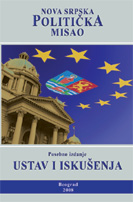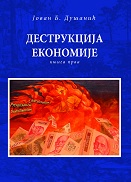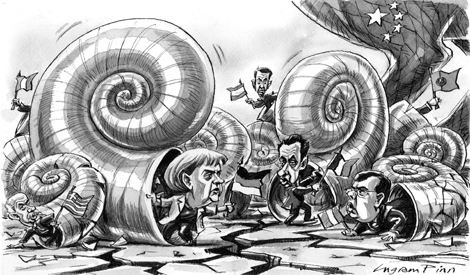| NSPM in English | |||
Europe’s leaders recoil from unity |
 |
 |
 |
| недеља, 05. децембар 2010. | |
|
As the European Union has turned in on itself in response to the shift of global power eastwards, so too have its member states. Leaders in Paris, Berlin and Rome who once foresaw Europe as an actor on the world stage have made way for smaller politicians scrambling to define narrow national interests. National sovereignty was previously a standard held aloft mainly by British eurosceptics. Now it is being invoked across the continent. Solidarity, set by the Union’s founding fathers as the cornerstone of Europe’s future, is an idea fallen into disrepair. In such circumstances, it is no longer fanciful to imagine that this unique experiment in supranational governance could yet rupture. The proximate cause of such an event would probably be another economic shock. Yet the underlying malaise is political. Governments, struggling to hold on to support at home, cannot adjust to a world that no longer belongs to the west. The new nationalism is being heard from the weak and the strong. In Ireland, the latest casualty of the debt crisis in the eurozone, voters fear that independence hard won from Britain nearly a century ago is being lost to the European Commission and International Monetary Fund. The European institutions that underwrote the shift to democracy of Spain, Portugal and Greece now threaten to become a straitjacket on their prosperity. Germany complains it is footing the bill for its feckless neighbours. The retort heard in the so-called peripheral states is that Berlin seems set on a German Europe. What has been lost is the sense of mutual interest on which the Union was built. Sharing sovereignty was not so long ago seen as a multiplier of power and influence. Now the Union is treated as a zero-sum game. As they are forced to surrender power to globalisation and a rising Asia, politicians imagine they can somehow reclaim it from Brussels. I become nervous when Angela Merkel says the future of the euro and that of the EU are inextricably linked. The problem is that she is right. The EU as we know it would not long survive the implosion of its most ambitious project. What worries me is that, on the evidence so far, Berlin does not have the political will to rescue the single currency. The German chancellor’s motives in making the link between the euro and the Union are doubtless honourable. The intention, her officials say, is to underscore the importance she attaches to defending the single currency. Berlin would never allow Europe to fail; ergo, it will safeguard the euro. The markets, though, are not blind. They have tracked the hesitancy that accompanied the Greek and Irish bail-outs and the caveats being attached by Berlin to future rescues. They can see that, in framing her European policy, Ms Merkel has one eye on public opinion and the other on Germany’s constitutional court. France, once a counterweight to the economics of deflation, seems now to think it has no option but to acquiesce. The crisis in the eurozone is rooted in economics: in the liquidity bubble that preceded the financial bust, in the profligacy of governments, and in the absence of a fiscal counterpart to monetary union. Yet the failure of policymakers to take back control of events marks the more important political shift. Germany has separated its national interest from the European interest. Cause and effect in the crisis now travel in both directions. The turmoil on bond markets corrodes confidence in the broader European enterprise; waning political enthusiasm for the Union drains governments of the energy and resolve to rescue the single currency. The paradox here is that it is not a Brussels power grab that has robbed governments of command of their national destinies. The culprits are globalisation and the shift in economic power from west to east. Yet when voters demand protection from the insecurities of the age, the politicians answer by blaming the EU. Portugal, Spain and Italy have now taken the place of Greece and Ireland in the sights of the markets. Berlin complains that it has been unfairly singled out for blame. Germany wants simply to be a “normal” country – a France, Italy or Britain weighing the national against the European interest. Germany, however, is not a normal country. It is too big, powerful and strategically important to behave like everyone else. Europe’s cohesion depends on Berlin acting as the continent’s shock absorber. The generation of leaders such as Helmut Kohl understood this. Ms Merkel’s economic orthodoxy is no substitute for Mr Kohl’s political insight. A German friend who has long followed closely her country’s foreign policy tells me that Ms Merkel’s dictation of a new set of rules for the euro marks a wrenching break with the postwar past. Two decades after unification, Germany is casting off all inhibitions about asserting its power. The single currency can be saved. If it came to it, the European Central Bank could simply buy up all the bad debts. The economics of rebalancing the eurozone to allow the weaker states to pay down their debts and regain their competitiveness is a more complex challenge. Austerity is unavoidable, but Spain, Portugal, Ireland and others cannot be condemned to semi-permanent deflation. Politics will not allow Europe to be remade in Germany’s image. And, ultimately, all this is about politics. European states are past going to war with each other. That has been one of the great achievements of the Union. The threat now is of irrelevance in a world that belongs to the Pacific rather than the Atlantic. The new nationalism can only hasten the process. http://www.ft.com/cms/s/0/1301e064-fe53-11df-abac-00144feab49a.html#axzz173UvVIfj |
Од истог аутора
Остали чланци у рубрици
- Playing With Fire in Ukraine
- Kosovo as a res extra commercium and the alchemy of colonization
- The Balkans XX years after NATO aggression: the case of the Republic of Srpska – past, present and future
- Из архиве - Remarks Before the Foreign Affairs Committee of the European Parliament
- Dysfunction in the Balkans - Can the Post-Yugoslav Settlement Survive?
- Serbia’s latest would-be savior is a modernizer, a strongman - or both
- Why the Ukraine Crisis Is the West’s Fault
- The Ghosts of World War I Circle over Ukraine
- Nato's action plan in Ukraine is right out of Dr Strangelove
- Why Yanukovych Said No to Europe

.jpg)








 (Financial Times, 02.12.2010)
(Financial Times, 02.12.2010)













